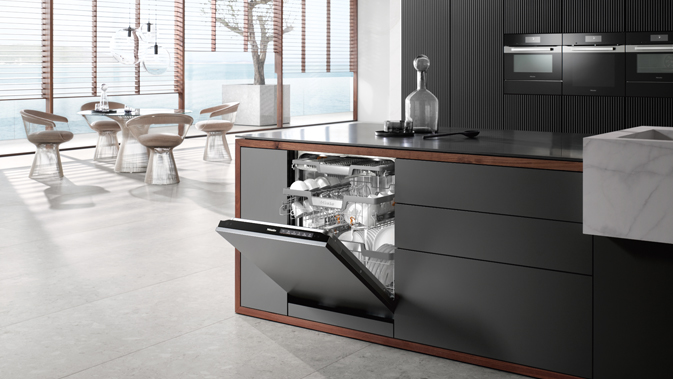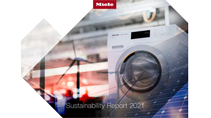Press releases
With Eco mode through the winter – economical, convenient and climate-friendly

-
Eco Mode scarcely used on washing machines and dishwashers
-
Unfounded reservations result in unnecessary additional consumption
-
Features from Miele go easy on climate and domestic finances
Germany has to conserve energy if it is to make it through the winter. A major and convenient lever in achieving this are climate- and budget-friendly Eco programmes on washing machines and dishwashers. There are seemingly serious misgivings among users, or at least unfounded reservations, preventing their use. Loads not properly cleaned, higher consumption, longer cycle times – but what is the truth?
As early as at the time of purchase, it pays to go for quality, durability and top energy-efficiency ratings. Consumers who then use the Eco mode on a washing machine or dishwasher reduce electricity consumption and, in part, water consumption even further. Nevertheless, these programmes are still under-used: Insights from industry surveys and pseudonymised data from connected machines from Miele allow the conclusion to be drawn that Eco programmes are only activated in around 25% of cases on dishwashers. The figure for washing machines is around 5%.
The energy this wastes is enormous: If the Eco programme were to be used every third time on a washing machine and every second time on a dishwasher, massive electricity savings would be the result. Depending on the intensity of use, these vary from 1.5 bn kWh per annum to more than 2 bn kWh pro. The reason for consumers' reticence in using the Eco mode result from common misgivings as to the suitability of these programmes on washing machines and dishwashers in everyday use. Here, the 4 most persistent myths are fact-checked:
Myth 1: 'Laundry and crockery does not come out properly clean in the Eco programme'.
Fact: As part of the energy label system, Eco programmes on both washing machines and dishwashers must meet strict legislative requirements which are monitored in laboratories and hence result in good performance in everyday use. On dishwashers from Miele, for example, smart water intake and optimised spray arms ensure that this is possible using less energy. Germany's consumer watchdog Stiftung Warentest confirms that even extreme soiling such as baked-on oat flakes or dried-on Bolognese sauce is removed in the Eco mode with its longer cycle time.* Alongside the Eco mode, Miele's innovative PowerWash on washing machines ensures that water consumption and hence also the energy needed to heat water is further reduced, producing good results.
However, it also remains true that the Eco mode cannot be used always. In certain situations, users are dependent on intensive or special programmes. For instance, Eco programmes are not recommended when washing garments with the 'Gentle' or 'Hand-wash' care label or for woollens. These textiles require the use of special programmes such as 'Delicates' or 'Woollens/Hand-care' in order to prevent damage and give fabrics the care they deserve. Similarly, certain stains and hygiene requirements demand the use of programmes which wash at 60 °C or even 90 °C.
Myth 2: 'As Eco programmes take longer, they use more rather than less energy'.
Fact: Precisely the opposite is true. Eco programmes on both washing machines and dishwashers operate at reduced temperatures. However, in the interests of good results, this is compensated for by longer cycle times. The reduced energy needed to heat up water far offsets the energy required to power the drum over the extended cycle time or to circulate water through the system. The bottom line is that a Miele washing machine with an A energy efficiency rating and fully loaded in Eco mode uses on average 0.9 kWh per cycle. A comparable Cottons programme requires 1.4 kWh. As little as between 0.5 and 0.8 kWh is used by a dishwasher in the Eco programme – instead of the 1 to 1.2 kWh in a programme with equivalent cleaning performance. Further potential is achieved by connecting machines to a hot water supply. In this case, the Eco mode on a Miele dishwasher then only requires 0.29 kWh.
Myth 3: 'Eco programmes take far too long'.
Fact: It is true that Eco programmes compensate for the energy-intensive heating of water through longer cycles, allowing for example longer exposure to detergents. It is also worthwhile taking a look at the performance data of an appliance as the differences between products from various manufacturers can be significant. An Eco wash cycle, for example, in a Miele washing machine takes only just short of 3 hours – not least thanks to the previously mentioned PowerWash feature. The Eco programmes on dishwashers from Miele require less than 4 hours – and that, too, is an excellent achievement compared with other manufacturers.
Myth 4: 'The frequent use of Eco programmes shortens the life cycle of machines'.
Fact: Washing machines and dishwashers from Miele are tested to last 20 years and endurance testing takes Eco programmes into account to reflect realistic use. Furthermore, additional strain resulting from the longer cycles in Eco programmes are very moderate and uncritical with respect to the impact on life expectancy.
It is also true that a hot intensive programme should be used regularly on both washing machines and dishwashers – or alternatively a recommended programme should be run using a machine cleaner. This reliably removes residues and bacteria and avoids foul smells. Similarly, the filter combination in the base of the dishwasher cabinet should be cleaned regularly. And, to ensure that a washing machine functions work reliable over its entire service life, accessible areas of the machine, for instance the door gasket, should be cleaned regularly. This removes deposits without trace, prevents odours and maintains the performance of a machine over time – but all this applies irrespective of how often the Eco programme is used.
* https://www.test.de/Geschirrspueler-im-Test-4685888-0/
Company profile: Miele is the world's leading manufacturer of premium domestic appliances including cooking, baking and steam-cooking appliances, refrigeration products, coffee makers, dishwashers and laundry and floor care products. Their product portfolio also includes dishwashers, air purifiers, washing machines and tumble dryers for commercial use as well as washer-disinfectors and sterilisers for use in medical and laboratory applications. Founded in 1899, the company has eight production plants in Germany, one each in Austria, the Czech Republic, China, Romania and Poland as well as two production plants belonging to its Italian medical technology subsidiary Steelco. Sales in the 2021 business year amounted to around € 4.84 bn. Miele is represented with its own sales subsidiaries and via importers in almost 100 countries/regions. Throughout the world, the family-run enterprise, now in its fourth generation, employs a workforce of around 22,300, of which approx. 11,200 employees work in Germany. The company has its headquarters in Gütersloh in Westphalia.
Download as PDF Download incl. media (zip)
Carsten Nagel
+ 49 5241 89-1009
carsten.nagel@miele.com


